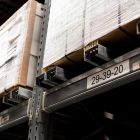Choosing the right forklift is crucial for any business. It can significantly impact productivity, safety, and operational costs.
But how do you make the right choice?
This is where forklift dealers come in. They provide expert advice and recommendations tailored to your industry’s specific needs.
In this article, we delve into what forklift dealers, like Active Forklift Fairfield, recommend for different industries. We’ll explore key factors to consider, from load capacity and fuel type to safety features and financing options.
Whether you’re a business owner, warehouse manager, or procurement specialist, this guide will help you make an informed decision on forklift sales and purchasing.
Understanding Your Industry’s Forklift Needs
Every industry has unique material handling needs. Therefore, the type of forklift you choose should align with these needs.
For instance, a construction site may require rough terrain forklifts. These are designed to operate on uneven surfaces and can lift heavy loads.
On the other hand, a warehouse might need electric forklifts. They are quieter, produce no emissions, and are ideal for indoor use.
Understanding your industry’s specific needs is the first step towards choosing the right forklift. Here are some factors to consider:
- The nature of the materials you handle
- The weight and size of the loads
- The height at which loads need to be lifted
- The operating environment (indoor, outdoor, rough terrain, etc.)
- The frequency and duration of use
Key Factors in Forklift Selection
Once you understand your industry’s needs, you can focus on the key factors in forklift selection.
The first factor is load capacity. Ensure the forklift can handle the maximum weight you need to lift.
Next, consider the lift height. The forklift should be able to reach the highest point you need to store or retrieve loads from.
Fuel type is another crucial factor. Electric, gas, and diesel forklifts each have their pros and cons, which we’ll discuss later.
Lastly, consider the maneuverability of the forklift, especially if you operate in tight spaces.
The Role of Forklift Dealers in Your Purchase Decision
Forklift dealers play a crucial role in your purchase decision. They provide expert advice and recommendations based on your specific needs.
A reputable dealer like Active Forklift Fairfield can guide you through the selection process. They can help you understand the different forklift types and their applications.
Moreover, dealers can offer financing options and after-sales support. This includes maintenance services and operator training.
Active Forklift Fairfield: A Case Study in Excellence
Active Forklift Fairfield is a prime example of a reputable forklift dealer. They offer a wide range of forklifts to cater to different industry needs.
Their team of experts provides personalized advice to help you make an informed decision. They also offer comprehensive after-sales support, ensuring your forklift remains in optimal condition.
Forklift Types and Their Industry Applications
Different industries have different forklift needs. For instance, a construction site may require a rough terrain forklift. This type of forklift is designed to operate on uneven surfaces.
On the other hand, a warehouse might need a reach truck. This forklift type is ideal for high rack storage systems.
Then there are telehandlers, often used in agriculture and industry. They can handle heavy loads and reach high elevations.
- Rough terrain forklifts for construction
- Reach trucks for warehouse operations
- Telehandlers for agriculture and industry
Choosing the right forklift type can optimize your operations. It can also reduce the risk of accidents and product damage.
Electric, Gas, and Diesel Forklifts: Pros and Cons
Electric forklifts are quiet and produce zero emissions. They are ideal for indoor use. However, they require charging stations and have a limited run time.
Gas and diesel forklifts, on the other hand, have longer run times. They are powerful and can handle heavy loads. But they produce emissions and can be noisy, making them less suitable for indoor use.
Understanding these pros and cons can help you choose the right forklift for your operations
Safety and Ergonomics: Non-Negotiables in Forklift Operations
Safety is paramount in forklift operations. Forklifts should have features like seat belts, load backrests, and overhead guards. These features protect the operator and prevent accidents.
Ergonomics is another crucial factor. An ergonomic forklift design can reduce operator fatigue. It can also boost productivity and efficiency.
In short, safety and ergonomics should be non-negotiables when choosing a forklift. They not only protect your employees but also contribute to your bottom line.
Financing and Leasing Options with Forklift Dealers
Forklift dealers often provide financing options to their customers. These options can make it easier for businesses to acquire the forklifts they need. They can also help businesses manage their budgets more effectively.
Leasing is another option offered by many forklift dealers. This option can be particularly beneficial for businesses that need forklifts for a limited period or want to avoid the upfront cost of buying.
In short, financing and leasing options can provide businesses with the flexibility they need. They can help businesses get the forklifts they need without straining their budgets.
The Advantages of Leasing Over Buying
Leasing a forklift can have several advantages over buying. For one, it eliminates the need for a large upfront investment. This can be particularly beneficial for small businesses or startups.
Moreover, leasing allows businesses to upgrade their forklifts more frequently. This means they can always have access to the latest models with the most advanced features.
After-Sales Support: The Value of Dealer Services
After-sales support is a crucial aspect of the forklift buying process. It can significantly impact the overall value that businesses get from their forklifts. Good forklift dealers provide robust after-sales support to their customers.
This support can include maintenance services, parts replacement, and troubleshooting assistance. These services can help businesses keep their forklifts in good working condition. They can also help businesses avoid costly downtime due to forklift issues.
In essence, the value of dealer services extends beyond the initial purchase. It continues throughout the lifespan of the forklift, providing businesses with peace of mind.
Maintenance, Training, and Warranty Considerations
Maintenance is a key consideration when buying a forklift. Regular maintenance can extend the lifespan of a forklift and ensure its optimal performance. Good forklift dealers offer comprehensive maintenance services to their customers.
Training is another important consideration. Proper training can ensure safe and efficient forklift operation. Many forklift dealers provide training services to their customers.
Lastly, warranty is a crucial factor to consider. A good warranty can protect businesses from unexpected repair costs. It can also serve as an indicator of the quality of the forklift and the confidence of the dealer in their product.
Conclusion: Making the Right Choice with Expert Recommendations
Choosing the right forklift for your industry can be a complex task. It requires careful consideration of various factors and expert advice.
By leveraging the expertise of reputable forklift dealers, businesses can make informed decisions. They can select the best forklifts that meet their specific industry needs and enhance their operations.





